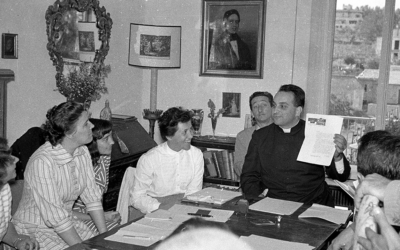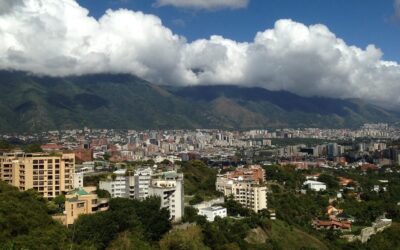 “You love God, the Father, also by giving food to you brother who is hungry. The whole development of literature on this issue, especially the great patristic literature, is a struggle against the selfishness of those that cause the misery of others, a kind of reconstitution of violated and degraded humanity, starting from the principle: nourish the stomach, to replenish the physical body which is also part of the Mystical Body: it too is a presence of the living Christ […]. Not everyone can work miracles, wrote St. Augustine, but everyone can feed the poor. “You cannot say to the paralytic, Arise and walk! But you can say: While we are waiting for you to get up, have something to eat…”. Anyone who would be able to feed the undernourished, the malnourished and the hungry and does not help them, is, according to a thought of the Fathers of the Church, a murderer, even a God-killer. He makes Christ die. Those who, during the years of war, condemned prisoners to die of hunger from the point of view of the Gospel have replicated the crucifixion. They have been, so to speak, murderers of God. The hordes of deportees, in the snow and blazing sun, in covered lorries or isolated ships, whose monotony was broken only by the collapse of the hungry, mark the line of practical atheism, even if perpetrated in the name of God For this reason, St. Vincent de Paul went out into the galleons of the most Christian kings, where the convicts fell exhausted. This is why works of mercy, by restoring justice, are not merely administration of food or of money to buy it. “Works of mercy are worth nothing without love,” says St. Augustine. And St. Paul says, “And even if I gave away all that I have to the poor, and though I give my body to be burned, if I have not charity, it is worth nothing” (1 Cor. 13, 3). Social works add little to the effects of religious life if those who carry them out do not bring that divine ingredient, that ardour of the Holy Spirit, which is charity […]. Works of mercy are a moral and material duty: by nourishing those in agony, I nourish myself: because his hunger is mine and of the whole social body, of which they are an organic part. “Though we are many, we are one body”, and you cannot injure one organ to benefit another. And if you do, you pay: with revolution and unrest and epidemics here, and then hell in the next life. It is tempting to think that this precept has become quite unnecessary in an era in which workers are reaching a certain comfort. Whereas it has never been so present and extended so vastly as in the era of rationing, of concentration camps, of deportations and unemployment, of war and the post-war period (…). A civilization that tolerates hunger alongside opulence is a civilization in a state of mortal sin (…). If someone does not have a ration, it means that someone else has two […]. Works of mercy are justified by the reality of human nature and perform the miracle of circulating love by circulating bread. The miracle is that the gift of bread becomes a kind of social sacrament, through which with love, we communicate God and through nourishing our body, we nourish our soul.” (from Igino Giordani, The Brother, Città Nuova, 2011, pp. 64-67)
“You love God, the Father, also by giving food to you brother who is hungry. The whole development of literature on this issue, especially the great patristic literature, is a struggle against the selfishness of those that cause the misery of others, a kind of reconstitution of violated and degraded humanity, starting from the principle: nourish the stomach, to replenish the physical body which is also part of the Mystical Body: it too is a presence of the living Christ […]. Not everyone can work miracles, wrote St. Augustine, but everyone can feed the poor. “You cannot say to the paralytic, Arise and walk! But you can say: While we are waiting for you to get up, have something to eat…”. Anyone who would be able to feed the undernourished, the malnourished and the hungry and does not help them, is, according to a thought of the Fathers of the Church, a murderer, even a God-killer. He makes Christ die. Those who, during the years of war, condemned prisoners to die of hunger from the point of view of the Gospel have replicated the crucifixion. They have been, so to speak, murderers of God. The hordes of deportees, in the snow and blazing sun, in covered lorries or isolated ships, whose monotony was broken only by the collapse of the hungry, mark the line of practical atheism, even if perpetrated in the name of God For this reason, St. Vincent de Paul went out into the galleons of the most Christian kings, where the convicts fell exhausted. This is why works of mercy, by restoring justice, are not merely administration of food or of money to buy it. “Works of mercy are worth nothing without love,” says St. Augustine. And St. Paul says, “And even if I gave away all that I have to the poor, and though I give my body to be burned, if I have not charity, it is worth nothing” (1 Cor. 13, 3). Social works add little to the effects of religious life if those who carry them out do not bring that divine ingredient, that ardour of the Holy Spirit, which is charity […]. Works of mercy are a moral and material duty: by nourishing those in agony, I nourish myself: because his hunger is mine and of the whole social body, of which they are an organic part. “Though we are many, we are one body”, and you cannot injure one organ to benefit another. And if you do, you pay: with revolution and unrest and epidemics here, and then hell in the next life. It is tempting to think that this precept has become quite unnecessary in an era in which workers are reaching a certain comfort. Whereas it has never been so present and extended so vastly as in the era of rationing, of concentration camps, of deportations and unemployment, of war and the post-war period (…). A civilization that tolerates hunger alongside opulence is a civilization in a state of mortal sin (…). If someone does not have a ration, it means that someone else has two […]. Works of mercy are justified by the reality of human nature and perform the miracle of circulating love by circulating bread. The miracle is that the gift of bread becomes a kind of social sacrament, through which with love, we communicate God and through nourishing our body, we nourish our soul.” (from Igino Giordani, The Brother, Città Nuova, 2011, pp. 64-67)
Pray for unity
Pray for unity




0 Comments